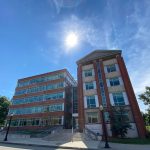Education is student-centric. In the conventional education system, schools and universities have set up organizations, policies, and systems to provide students with the things that they need. COVID changed the educational landscape. Today, a larger number of schools in the country are considering online education, a move that raises questions on topics of learning, creating meaningful relationships with students, and the influence of socioeconomic status (SES) on education.
In a state that is “massively struggling” to create educational equity, Casey Cobb, a professor of educational policy at UConn’s Neag School of Education, also shared concerns about microschools widening the gap between Connecticut’s “haves and have nots.” If families with political connections and wealth stop using public schools, it can be a disadvantage to those students who have no other options, he said.
The Neag School is proud to announce for the 2020-21 academic year a number of new hires across each of its academic departments. In addition, the School announces several faculty promotions and new appointments for existing members of the Neag School community, effective Aug. 23.
“Work hard on keeping the conversation channels open. Having a trusted and caring adult is critical for every child,” writes Sandra Chafouleas in her new blog on Psychology Today.
I recently read a post from a frustrated parent who attended a back-to-school virtual meeting. The parent wanted practical steps on preparing for school, but instead received a lot of information about mindfulness and social-emotional health. The school perhaps missed an opportunity here to engage families in why social, emotional, and behavioral health is so important, and how it is critical for schools and families to partner as we head into fall.
With a new school year rapidly approaching, there are concerns over COVID-19 and how it may change what this year could look like.
Doug Glanville narrates his poem which honors baseball’s Black pioneers, in celebration of the 100th anniversary of the Negro Leagues.
The state Department of Education partnered with Columbia University this summer to figure out the best way for children to learn during the pandemic. A big part of their solution is something called “real-time learning.”
“The larger the school choice program, the greater the possible stress on public schooling. This should be of special concern in a pandemic when we know there’s a very good chance that public school funding will be reduced,” said Preston Green, a professor of educational leadership and law at the University of Connecticut.
Researchers from UConn and the Cary Institute of Ecosystem Studies have been awarded a $3 million grant from the National Science Foundation Research Traineeship Program to fund a new program to help train graduate students in risk analysis to build resilient landscapes in the face urbanization and climate change.



